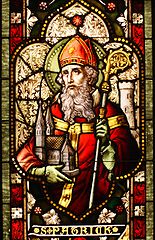
The Life And Writings Of Saint Patrick -Saint Patrick
III.—ST. PATRICK AND THE SCHOOLS OF THE BARDS
We may with propriety say a word here about Patrick’s dealings with the Bards of ancient Erin. Nothing else in his whole career shows in a more striking way his practical wisdom and consummate prudence. The Bards, as we have seen, were one of the three privileged orders in ancient Erin, a class of great influence and of old renown, who might be made either powerful friends or unrelenting foes. They were, until their lampoons and extortions became intolerable, very popular with all classes, and being a kind of close hereditary college or corporation, were formidable from their profession, their numbers, and their organised power. As a class they had no special interest like the Druids in opposing the spread of the new religion in Erin. Dubthach Mac Ua Lugair, the Arch Poet of Erin, was the very first to rise up to do honour to Patrick and accept his doctrine. Afterwards he became Patrick’s fast friend, and most sagacious counsellor. He was ready, as in the case of Fiacc of Sletty, to hand over to Patrick his most promising pupils for the service of the infant Church. In the reform of the Brehon Laws his services were simply invaluable, for as Chief Poet he had a professional knowledge of the whole Brehon Code, and was thus enabled to exhibit, as we are told, to Patrick, ‘all the judgments and all the poetry of the men of Erin, and expound every law which prevailed amongst the men of Erin, through the law of nature and the law of the seers, and in the judgments of the island of Erin and in the poets.’ Chiefly through his assistance Patrick was enabled to produce an expurgated code of the ancient laws of Erin, and secure its adoption by the King and the chiefs of Erin. For such services Patrick was duly grateful to Dubthach, and to all the Bardic Order, and he always welcomed its junior members into the service of the infant Church.
This friendly alliance of Patrick with the Bards is recognised in all our national traditions, and finds expression in the ancient tales of the Saint’s kindly relations with Ossian, the most renowned of all the Bards of ancient Erin. He was the sole survivor of the great warriors who fell in the fatal field of Gavra (Gabhra), leading a kind of enchanted life in the new and strange order of things which arose in Erin. He was friendless and alone, living in the past rather than in the present, waking always notes of woe when his feeble fingers touched the strings that were once attuned to the fierce joys of battle or the melting lays of love.
Then Patrick, in the mild spirit of the Gospel, took the forlorn old warrior into his own family, soothed him in the sorrows that clouded his age, let him rave as he would of the olden glories of pagan Erin, and then gently brought him back to the present, lighting up the old man’s heart with the light of faith, and consoling his stricken spirit with the hope of a happier life beyond the grave.
“And now I tread a darker brink,
Far down unfriendlier waters moan,
And now, of vanished times I think,
Now of that bourne unknown.
“Say, Patrick of the mystic lore,
Shall I, when this old head lies low,
My Oscar see, and Fionn, once more,
And run beside that Doe?”
And Patrick cried, “Oisin! the thirst
Of God is in thy breast;
He who hath dealt thy heart the wound,
Ere long will give it rest.”
AUBREY DE VERE.

 Keep Site Running
Keep Site Running